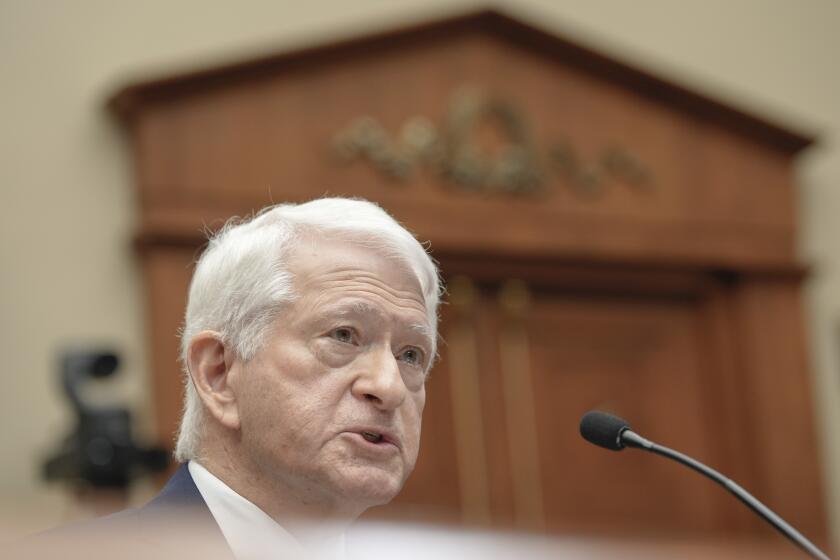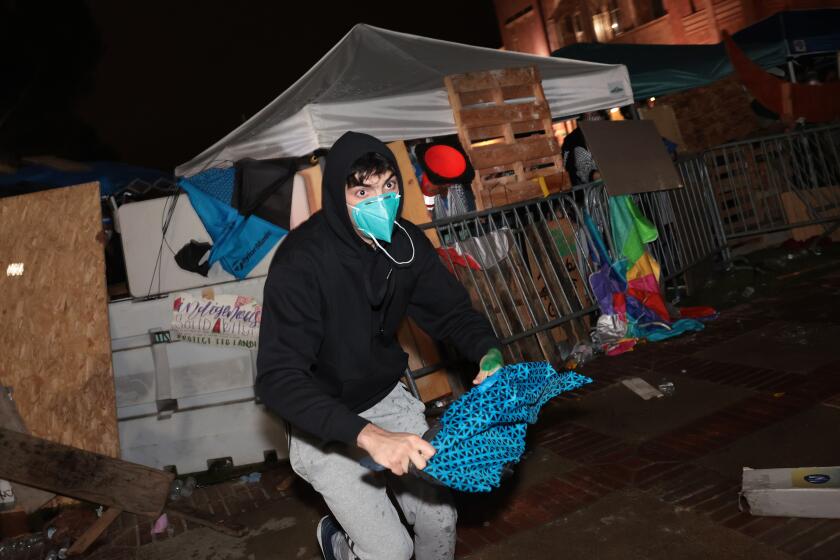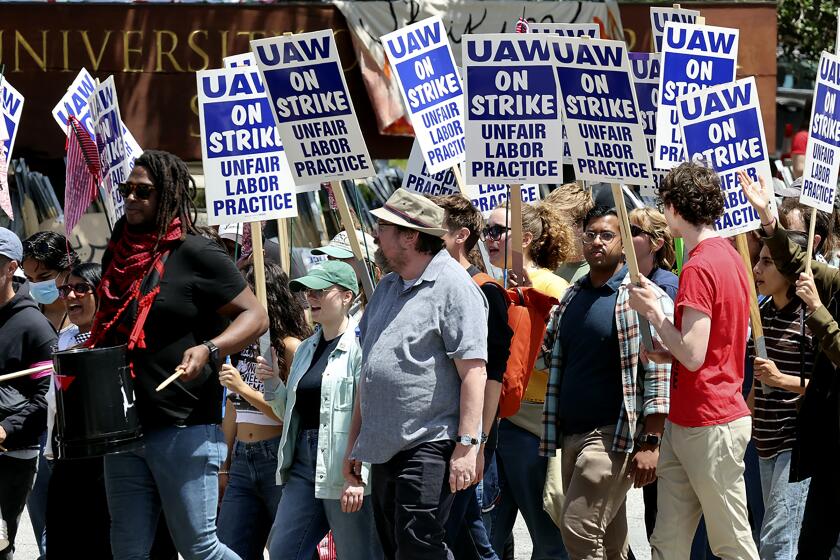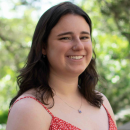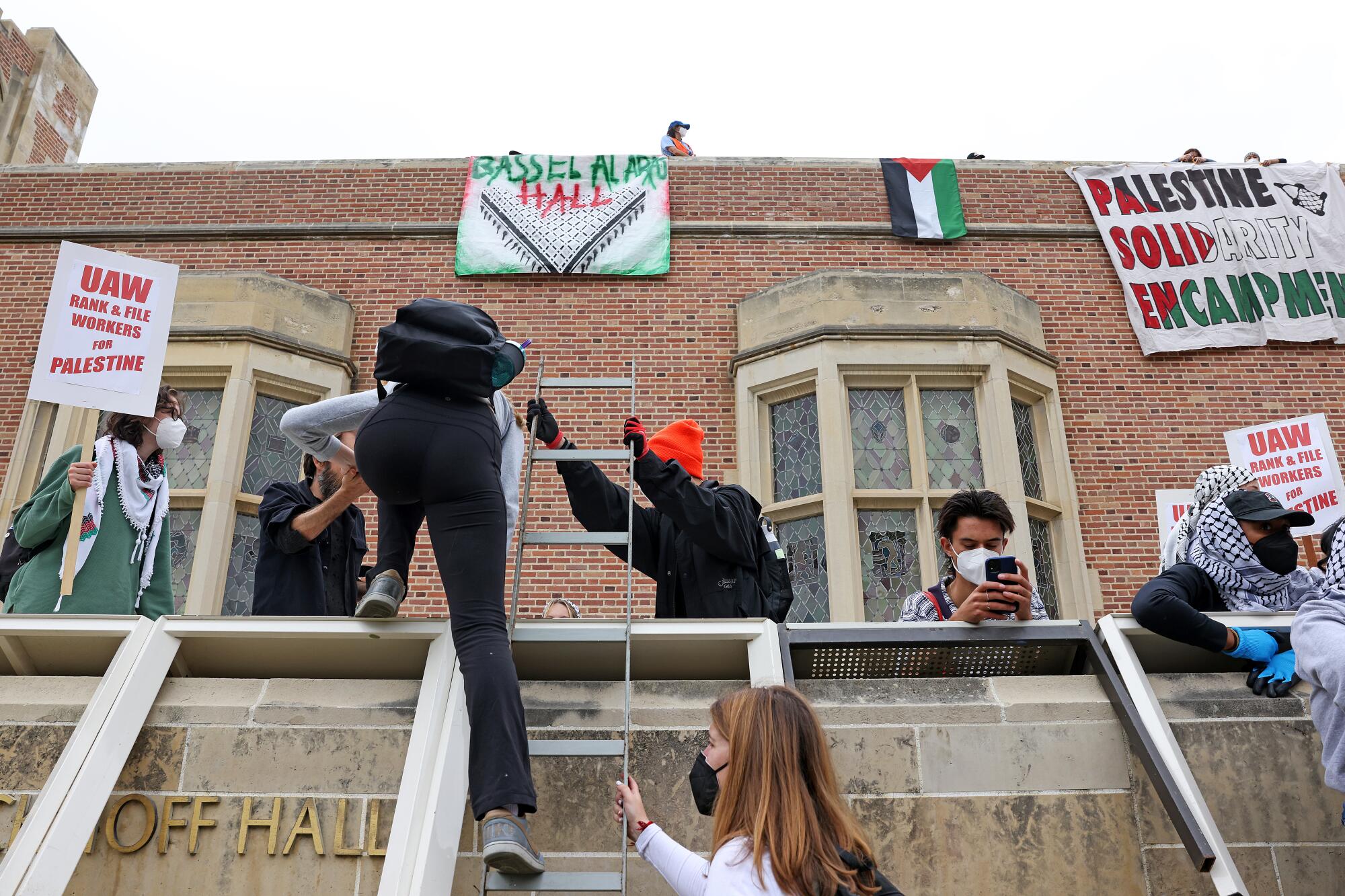
More than two dozen officers in riot gear descended on UCLA Thursday afternoon, facing off with pro-Palestinian protesters who had erected a new encampment on campus hours earlier.
The move came amid escalating tensions between pro-Palestinian students and their faculty allies and administrators on the Westwood campus. The academic workers union announced Thursday that its ongoing strike over working conditions would expand to UCLA and UC Davis on Tuesday.
Union members contend that their free speech rights were violated when UC system leaders called on police to forcibly remove pro-Palestinian encampments at several campuses, including at UCLA.
“It’s a very fraught, violent environment that the administration has created here,” said Vincent Doehr, a graduate student and union member. “The disruption to campus today is coming from administration shutting down this entire area due to an encampment that’s simply in the courtyard of one building.”
What started as a small group of protesters setting up a few tents on the Kerckhoff patio Thursday morning had grown to several hundred supporters, including academic union members, outside the encampment by the afternoon. Police pushed back the crowd, which eventually retreated to another area of campus near Murphy Hall, and tore down the encampment and wood pallets surrounding it.
A campus spokesperson said no arrests had been reported by Thursday afternoon. It was not clear whether anyone had been injured.
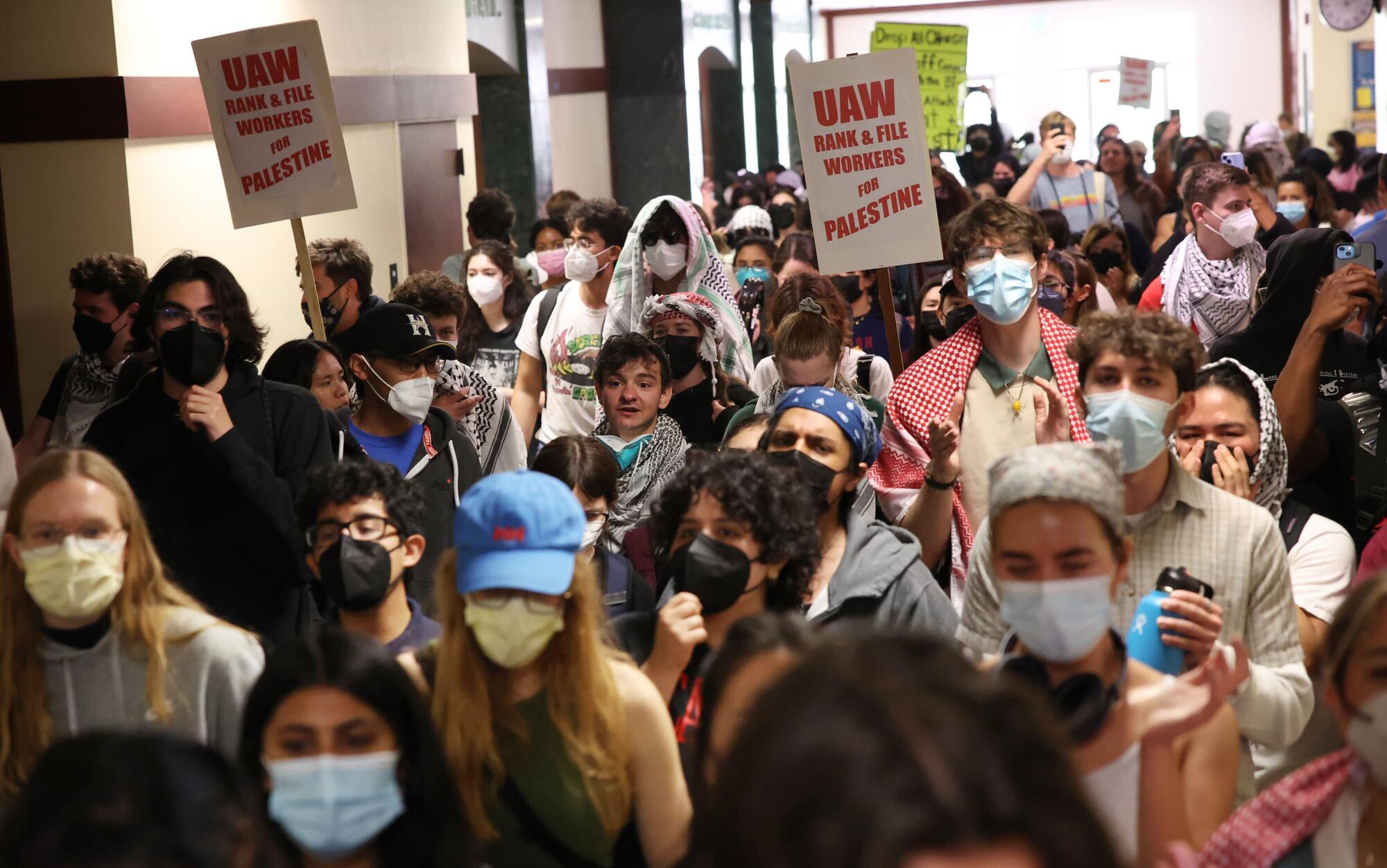
Video from the scene showed protesters marching through Dodd Hall chanting, “From the river to the sea, Palestine will be free.” A Palestinian flag hung from a second-floor window of Dodd Hall.
Sebastian Cazares, a UCLA grad student and a local education and civil rights organizer, said the new encampment was set up to show that “police repression could not stop this movement.”
“Despite the fact that this is a peaceful movement, they’re still learning no lessons and sending out militarized law enforcement in response,” he said.
Doehr said he hoped the strike would prompt the university to “negotiate in good faith with the movement for divestment, rather than calling the police on students every time they protest.”
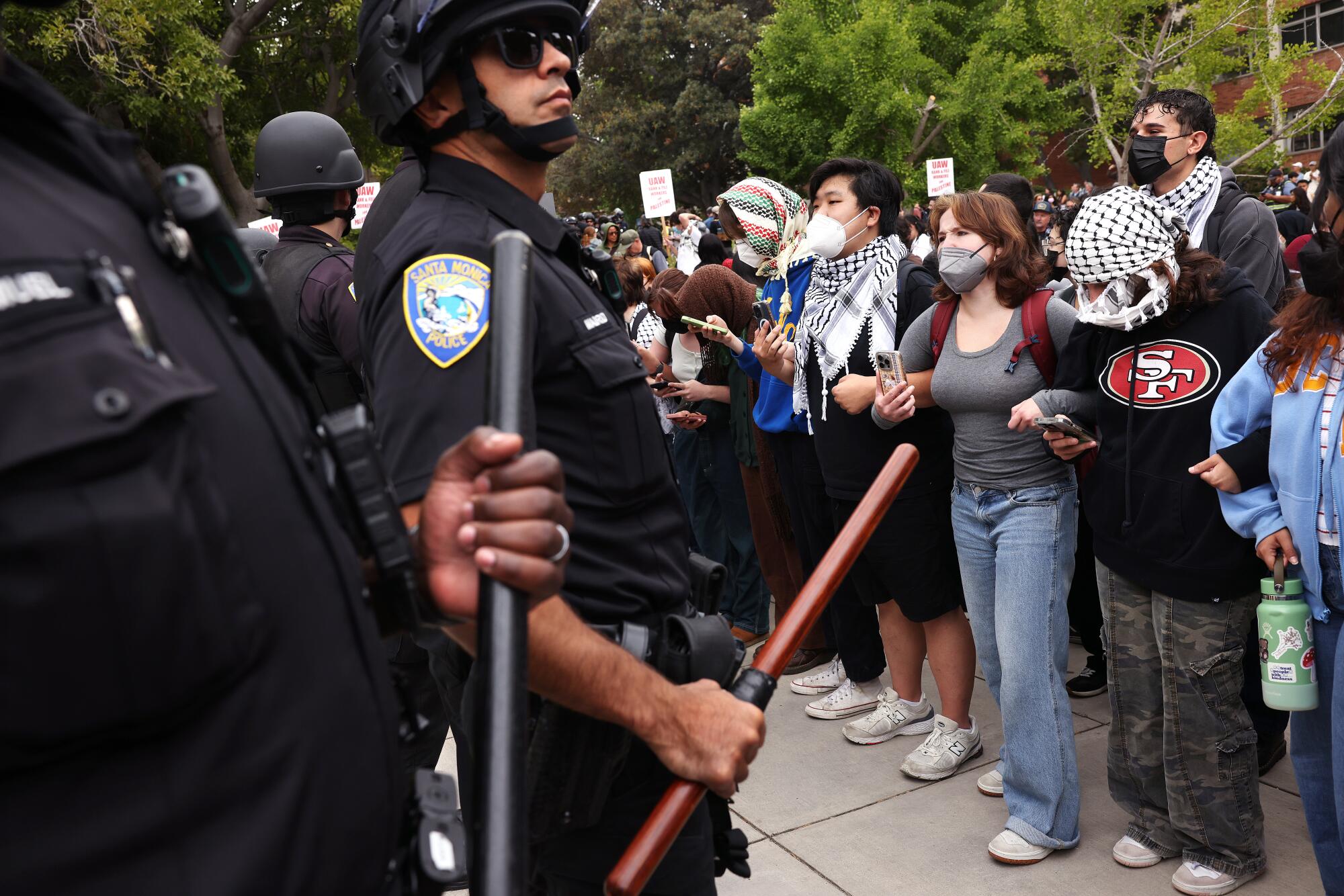
According to the union, dozens of academic workers are still facing criminal charges, disciplinary action or both. Many are barred from campus, the union said, including campus housing and classes they may teach or attend.
Hours before police arrived, campus officials had warned those in the encampment to disperse or face potential disciplinary and legal action.
“Law enforcement is prepared to arrest individuals, in accordance with applicable law,” administrators wrote in a letter to protesters. “We remain committed to supporting the safety and well-being of Bruins, supporting the free expression rights of our community, and minimizing disruption to our teaching and learning mission.”
By the afternoon, a handful of students in kaffiyehs sat outside the north end of the encampment, sharing drinks and snacks. They were there to show support for the protesters, one said. A small crowd gathered on the south end of the encampment, some holding signs that read, “UAW rank & file workers for Palestine.” Protesters marched in a circle outside the nearby Mathematical Sciences Building, chanting, “Free Palestine.”
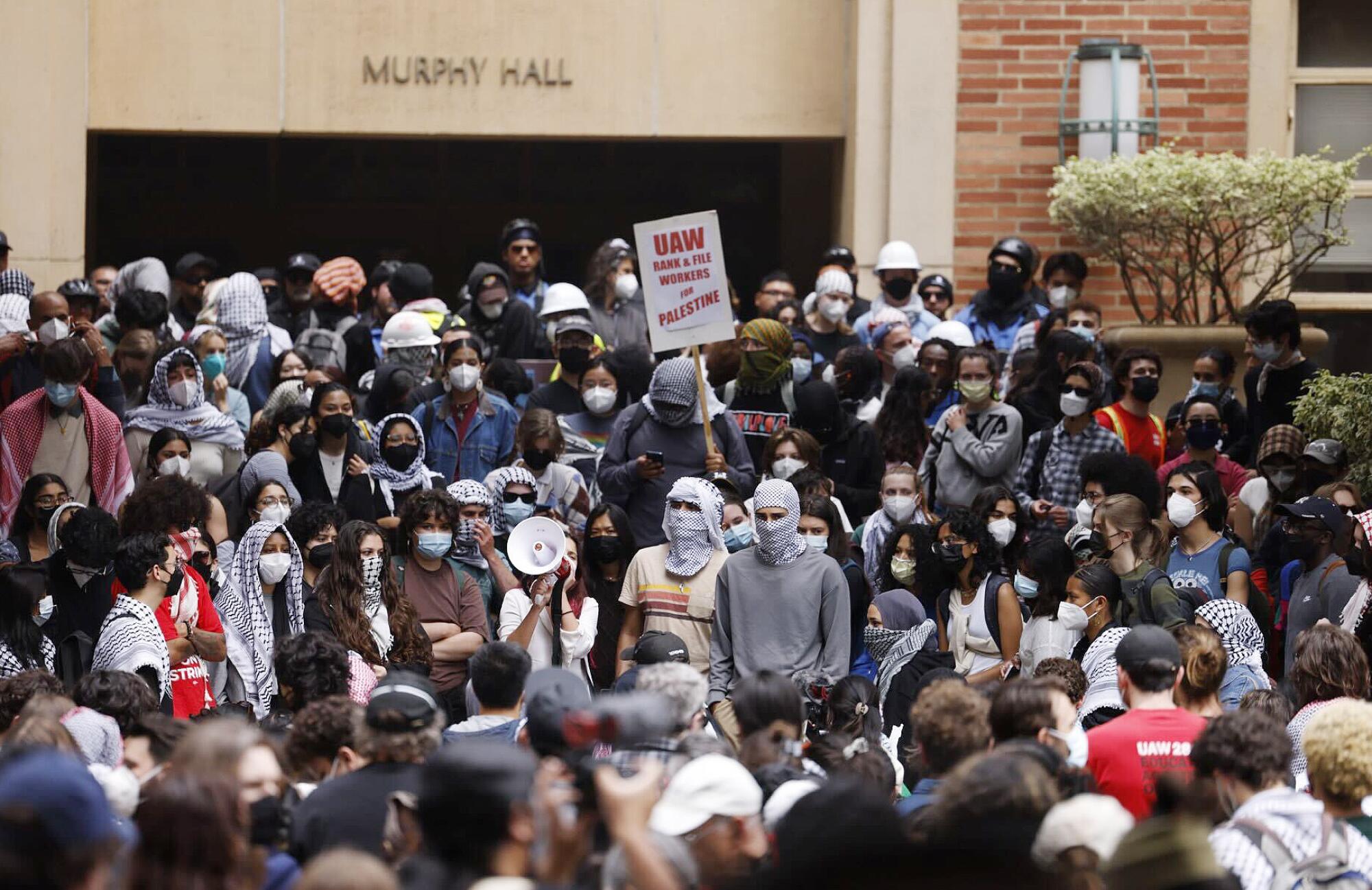
Police tape blocked off the entrance to the encampment, and officers prevented people from entering the area. At one point, protesters surged past the police tape to deliver water to the site. Classes held in the buildings surrounding the encampment were shifted online.
Administrative Vice Chancellor Michael Beck and Associate Vice Chancellor for Campus Safety Rick Braziel said in a statement that the “demonstrators’ activities — including erecting barricades, establishing fortifications, and blocking access to parts of the campus and buildings — are disrupting campus operations.”
The police response to the encampment came on the same day that UCLA Chancellor Gene Block, who has led the university amid months of tense protests over the Israel-Hamas war, testified before a congressional hearing on campus antisemitism.
Republicans questioned UCLA Chancellor Gene Block and the presidents of Northwestern and Rutgers university on the their handling of pro-Palestinian encampments, including UCLA “checkpoints” put up by protesters that prevented people they identified as Zionists from entering a camp.
Dana Kopel, a second-year PhD student at UCLA who is a supporter of Palestinian solidarity actions on campus, said the congressional inquiry was “part of the larger process in the U.S. to frame antisemitism as a means to suppress student protest and the justification for the violent suppression of student protests at UCLA and elsewhere.”
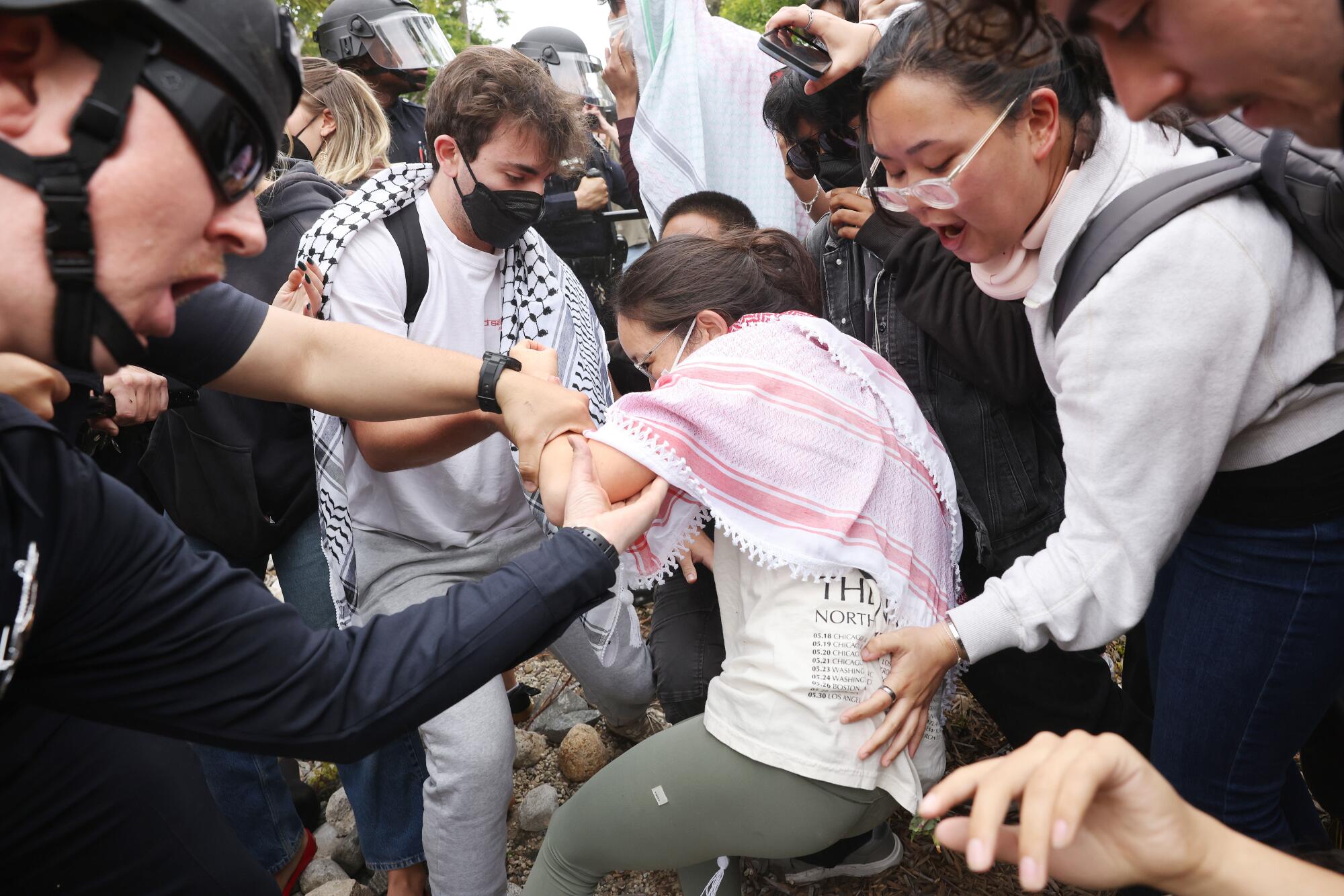
Some Jewish students on campus said they felt intimidated by the initial encampment as protesters scrawled graffiti such as “Death 2 Zionism” on campus buildings and blocked access. The phrase “From the river to the sea, Palestine will be free,” which is frequently used at protests, has also been seen as antisemitic among certain groups, including the Anti-Defamation League.
Kopel said students involved in the protests have “remained steadfast” in their support for Palestinians and their goal to end the bloodshed in Gaza.
“So many of these students faced such intense violence just a few weeks ago,” Kopel said. “I think that’s why there’s a real effort to communicate that the risks of this are high. The university has made it clear and the government has made it clear that they want to suppress the solidarity movement at all costs.”
In early May, more than 200 people were arrested on the UCLA campus as police dismantled tents and pushed out protesters in a clash that lasted hours. The police operation capped two days of upheaval on the campus that began when school officials declared the encampment “unlawful” and continued when a group of pro-Israeli counterprotesters attacked the camp, with police taking hours to stop the violence.
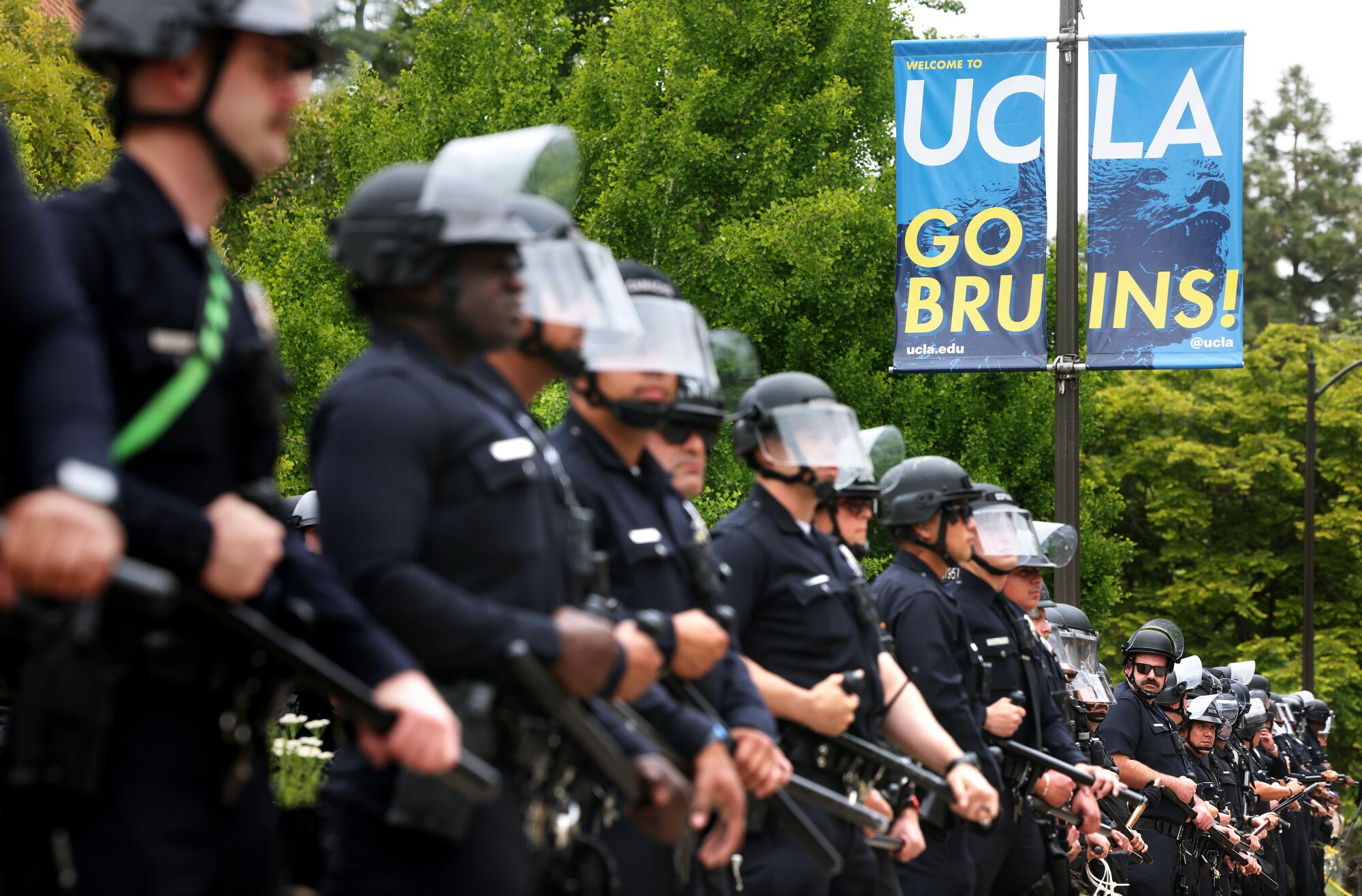
Rafael Jaime, a UCLA graduate student and local union president, was at the encampment during the attack in late April and witnessed firsthand what he said was the university’s inaction.
“I was there for many hours while the university stood by and allowed the attack to continue,” he said. “The university has engaged in very serious unlawful behavior that resulted in many of us getting hurt.”
Here is what we know about the last couple of weeks on campus, based on interviews, recordings, social media and documents.
UCLA officials have been sharply criticized over their handling of the situation. UCLA Police Chief John Thomas on Wednesday was removed from his post and reassigned over security failures that led to violence at the encampment. Thomas, who did not return phone calls this week seeking comment, defended his actions in a previous interview and said he did the best he could.
UCLA, like other universities across the country, has emerged as a hotbed of pro-Palestinian activism in recent months.
Students, faculty and staff have erected makeshift camps and demanded an end to Israel’s war in the Gaza Strip and that their universities divest from companies that sell weapons or services to Israel. Several camps, including one at Cal State Los Angeles, remain active. Others, including one at USC and another at UC Irvine, have been dismantled by police in recent weeks.
The legality of the ongoing strike by UC academic workers in support of pro-Palestinian demonstrators will go before the state labor board this week.
Union leaders have demanded protection for free speech on campus; amnesty for all academic employees, students, student groups, faculty and staff who face disciplinary action or arrest due to participation in protests; and divestment by the university from “weapons manufacturers, military contractors and companies profiting from Israel’s war on Gaza.”
In response, the university has asked the state labor board to seek a court injunction to halt the strike, contending that the action is illegal.
UCLA graduate student and elected union leader Anny Viloria Winnett said it’s essential that workers go on strike to stand up for a safe environment and free speech.
“There is no existential threat larger for a union than not being able to speak our mind and protest,” she said.
Times staff writers Jaweed Kaleem, Richard Winton and Teresa Watanabe contributed to this report.
More to Read
Sign up for Essential California
The most important California stories and recommendations in your inbox every morning.
You may occasionally receive promotional content from the Los Angeles Times.
